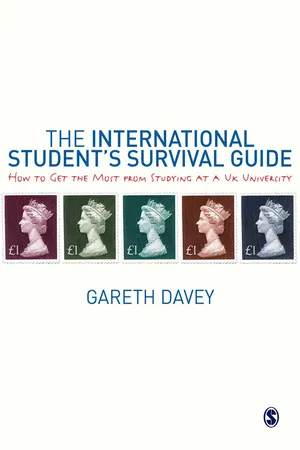
The International Student′s Survival Guide
How to Get the Most from Studying at a UK University
- 200 pages
- English
- ePUB (mobile friendly)
- Available on iOS & Android
The International Student′s Survival Guide
How to Get the Most from Studying at a UK University
About This Book
The International Student?s Survival Guide is a comprehensive and easy-to-use guide to studying and living in the UK. It will be invaluable in preparing international students for the inevitable differences in culture, customs, and academic life, and helps to ensure they get the most out of their time at University. Gareth Davey provides students with all the information needed to make the right choice about where to study and provides valuable advice on how to settle into your new surroundings, including guidance on:
- Choosing and applying for a course Leaving home and arriving in the UK
- Managing finances and living costs
- Academic culture
- Teaching and assessment methods
- Health and welfare
- Life after graduation
Throughout the guide there are checklists and self-evaluation forms to help the reader chart their progress. A glossary is included to aid understanding of the topics covered, and directories of additional sources of information make it easy to find out more where necessary. This guide will be a useful resource for students coming to the UK to embark on either undergraduate or graduate study in any subject.
SAGE Study Skills are essential study guides for students of all levels. From how to write great essays and succeeding at university, to writing your undergraduate dissertation and doing postgraduate research, SAGE Study Skills help you get the best from your time at university. Visit the SAGE Study Skills hub for tips, resources and videos on study success!
Frequently asked questions
Information
1 Choosing and applying for your course





- Internationally recognized and respected qualifications. The UK higher education system is world-renowned. A degree or other qualification will demonstrate your knowledge and skills, and will enhance your career prospects.
- Quality. Universities have excellent teaching and learning standards. Academic quality is checked regularly to ensure good quality teaching and learning experiences.
- Accessibility and variety. There is a range of access routes to higher education, and attendance on many courses is flexible. There is also a wide variety of programmes.
- Shorter and intensive degrees save time and money. Some courses, particularly three-year undergraduate degrees and one-year Master degrees, are shorter in duration compared to equivalent courses in other countries.
- Research excellence. UK universities have excellent research profiles and facilities.
- British culture and easy access to Europe. The UK has a rich culture and history that can be explored during your leisure time. It is also easy and inexpensive to travel to other European countries during your vacations.
- Immersion in an English language environment. Studying in an English-speaking country, surrounded by native speakers, will help you to improve your English language and communication skills.
- Personal development. Courses will develop your skills and personal qualities. Experience in another country and culture will also widen your perspective on life.
- Emigration. It may be possible to stay in the UK after graduation, for further study or for other reasons.
- Fun! Life is all about having fun, and enjoying yourself. There are many opportunities to enjoy an active social life.
Table of contents
- Cover Page
- Title Page
- Copyright Page
- Contents
- Introduction
- 1 Choosing and applying for your course
- 2 Leaving home and arriving in the UK
- 3 English language requirements for your course
- 4 Tuition fees and living costs
- 5 Daily life and culture in the UK
- 6 Health, welfare, and safety
- 7 Academic culture in the UK
- 8 Teaching and assessment methods
- 9 Study skills you need for academic success
- 10 Life after graduation
- Glossary
- Directory
- Index